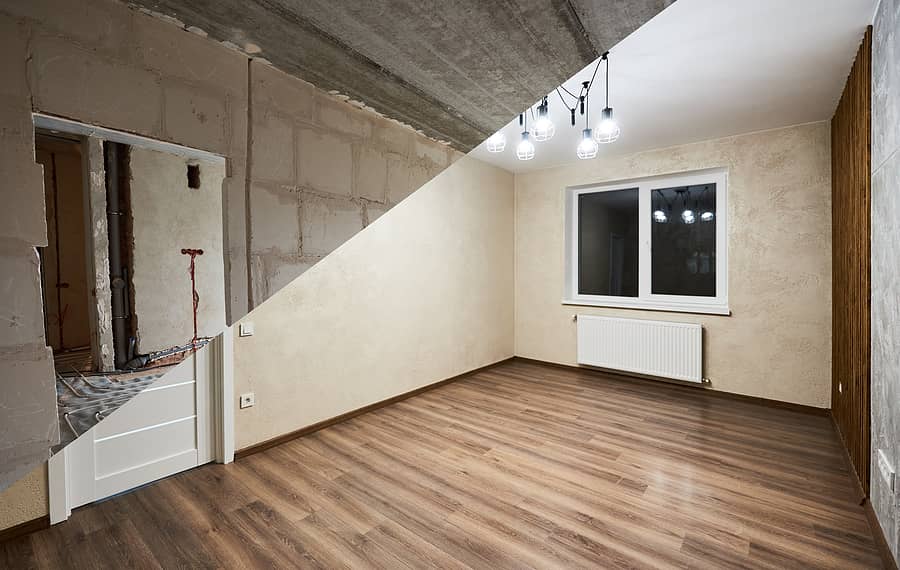Private lending is available for renovation and new construction. However, there are some differences between the two. Renovation loans are usually approved quickly with more flexible terms and cater to short-term, smaller-scale projects.
As the name implies, new home construction involves longer-term financing and more money. That generally means the assessment process is more prolonged and stricter. New home construction loans are usually dispersed in stages called draws. On the other hand, renovation loans can be taken out as a lump sum.
One of the other differences between the two projects is the risk is generally seen as higher with a new construction loan. That’s because lenders are basing their numbers on the projected value of the finished product.
New Construction Private Lending Vs Renos. The Differences.
There are some other distinct differences between private lending for renovations versus new construction that you need to be aware of.
New Construction Loans
These are loans specifically designed for people who are constructing a new home. They’re considered risky and quite often have high-interest rates. They have some other characteristics:
- They require a detailed cost breakdown. This can include the construction cost per square foot and is based on whether the house is pre-designed or custom-built and its location.
- The funds don’t get released all at once from a private lender for new construction loans. The money gets released in draws as the construction progresses when milestones are met. Inspections are usually necessary before a draw gets released. It’s also important to know that borrowers pay interest on the draw amount, not the total loan. Some schedules can include milestones like money for a foundation draw, a drywall draw, and a completion draw.
It’s also important to remember that when the construction is finished, these loans often need refinancing to a permanent mortgage. Private lenders have different qualifications that are more flexible than those of more traditional institutions. For example, they focus more on available equity than credit scores. In particular, they use what’s called a loan-to-value ratio that incorporates equity.
If you’re a homeowner looking to get one of these new construction loans from a private lender, there are some other angles to consider. Remember, most private or alternative lenders will require over 25% of equity before they approve your application.
There’s a different set of criteria to consider when you already own your home and are looking to upgrade or renovate.
Renovation Loans
Thinking about redoing a kitchen or bathroom or any other renovation project? Private lending provides short-term financing that can be specifically tailored to your needs. While it’s important to remember private loans usually come with higher interest rates, the process is also more streamlined than with the conventional loan.
Some loan amounts are based on the projected value of the finished renovation. They usually offer a lower interest rate than a construction loan. Remember, most private or alternative lenders will require over 25% of equity before they approve your application.
This type of loan is used on an existing property or home, and it can be implemented for a wide range of projects. For example, HGTV reports that kitchen renovations have the highest returns in 27 of 31 market studies, according to a recent RE/MAX survey.
Some of these renovation loans can be based on the projected value of the property or home after the work is completed. Another metric used is the Loan to Value Ratio. .
Private lenders arrive at this number by dividing the amount of the requested mortgage by any existing one and the appraised market value of the property. most of these alternative lenders don’t approve loans if the LTV is over 75%
What are the benefits and risks of private loans for new building projects?
New building projects need to be planned out carefully, which involves weighing both the benefits and risks of private loans. Keep in mind these products are an excellent alternative for people who don’t qualify for a traditional mortgage loan.
The Benefits
- Private lenders offer flexible products if you have a poor credit score. These loans are also good if you are self-employed or have an irregular income.
- New home construction and other types are usually time-sensitive projects. The quick financing you can get through private loans is another bonus over traditional institutions.
Remember that dealing with financing involves a certain amount of risk too.
The Risks
- New building projects funded through private lending come with higher interest rates than more conventional loans.
- It’s also important to remember that, unlike traditional mortgages that emphasize items like credit score, private mortgages put more emphasis on a property’s location and value. An applicant’s financial situation is the secondary consideration.
That means a private lender can be quicker to foreclose or use a power of sale.
Finally, you need to remember that some private lenders offer interest-only products. Borrowers who can’t get more traditional bank financing can wind up in a cyclical, higher-cost, short-term mortgage cycle.
Are there specific loan structures preferred for renovations in Ontario?
Homeowners typically choose from the following loan products for renovations.
- A Home Equity Line of Credit (HELOC). Due to the low-interest rates and flexibility, this product allows you to borrow money against the equity in your property. It’s an excellent way to finance large-scale renovations because it provides a revolving credit line.
- Refinancing your mortgage is another option. It’s important to remember this amount gets rolled over into the balance on your mortgage. There’s a separate payment you need to make.
- A private loan is an option that has several benefits including faster turnaround times. Remember private mortgages and loans are less regulated than ones at banks and credit unions. Private loans for renovations take the focus off your credit score and place it on equity and Loan to Value (LTV) ratio.
One of the final decisions to make is between the two types of loans.
How do borrowers choose between renovation and new construction loans?
Choosing between a renovation and a new construction loan can come down to the project’s scope.
- For example, renovation loans are preferred for modifications, additions and updates to existing structures.
- New construction loans, as the name implies, are best for building things from the ground up or renovations that involve a big rebuild.
Put differently, one of the big factors that can help you decide between the two is the total cost of the project and your budget. New construction loans cost more because they include buying the land, all the permits necessary, and detailed construction costs.
Are you Looking for Private Mortgage Loans?
Mortgage Broker Store focuses on private mortgage-related products. Mortgage applications that don’t meet traditional lending requirements are a specialty. Our team of private lenders, brokers, and licensed mortgage agents is ready to help. Let us help you get a mortgage loan that fits your requirements today.
Email ron@mortgagebrokerstore.com or call 416-499-2122.



